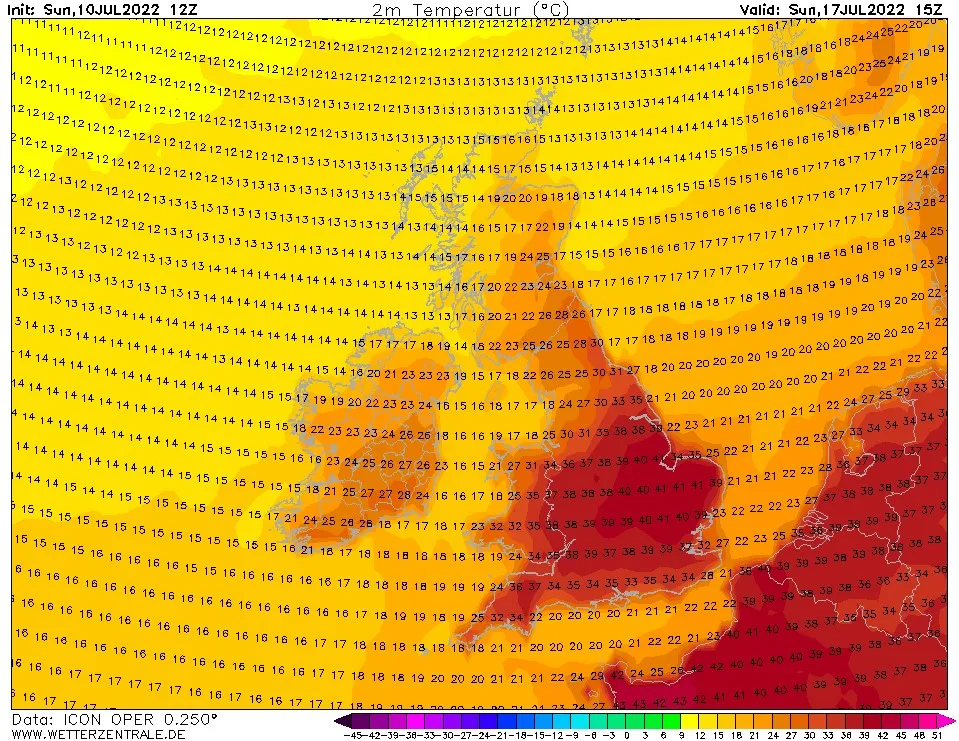A heatwave that is hitting countries across Europe will send temperatures soaring in the UK this week. The Met Office has issued extreme heat weather warnings for Sunday 17 and Monday 18 July.
According to the Met Office, temperatures in the southeast could reach 35°C, with much of the south seeing temperatures around 32°C, but some weather models are showing the possibility that the UK could reach as high as 40°C this week – breaking the current record for the UK's highest temperature.
The 2022 European heatwave has already caused the spreading of wildfires in Portugal and in France, and it follows a similar extreme weather event in June that caused droughts in some EU countries.
The UK Health Security Agency (UKHSA) and the Met Office have issued health alerts for many UK regions, with individuals warned to stay hydrated and in the shade between 11am and 3pm wherever possible. Though many will want to be out in the sunshine, heatwaves can be deadly – in the UK in 2020, an estimated 2,500+ extra deaths were related to heatwaves, according to Public Health England.
Climate scientists have warned that temperatures will continue to rise, so much so that London will, in 2050, feel as hot as summer in Barcelona is now. Climate change is making heatwaves hotter and longer, and without significant action to reduce greenhouse gas emissions, there will be many more extreme weather events in the UK's future.
Will the UK hit record-breaking temperatures above 40°C this week?
"I have been watching all the global weather centre models over the last few days, and many of them are showing a possible – but not most likely – 40°C heat, or more," said Prof Hannah Cloke, a natural hazards researcher at the University of Reading.
"The fact that this is appearing in our weather models at all as a possibility is quite remarkable."

The current hottest UK temperature on record is 38.7°C, which occurred in July 2019 at the Cambridge Botanic Garden. At these high temperatures there is a risk of heat stroke and cardiovascular failure.
High temperatures have also been shown to affect mental health and suicide rates. Increases in accidents, like car crashes and drownings, are linked with rises in temperatures.
When will the heatwave end?
The Met Office's long-range forecast is less reliable than figures for the rest of this week, but suggests that from Tuesday 19 July onwards, the UK will see a return to cooler weather conditions.
The following week's forecast, from Tuesday 26 July to Tuesday 9 August, is for "generally fine weather". Temperatures will likely be above average for most, said the Met Office, especially in the south, with the potential for it to be hot across England and Wales.
Should we expect heatwaves every summer in the UK?
"The current heatwave has certainly made the headlines. It’s not the first this year, and probably won’t be the last. We’ll get more next year, and the year after, and so on," said Prof Nigel Arnell, from the department of meteorology at the University of Reading.
Arnell says UK summers will see more and more days where it's too hot to work, as well as temperatures damaging to our health – all due to climate change.
"Work by the Department of Meteorology shows that heat-related mortality will increase. Not only does this affect individuals, families and communities, it all puts pressure on our health services and economy," said Arnell.
“We’re not really geared up to deal with more frequent heatwaves, other than through enacting emergency plans, and we can’t really run in crisis mode each and every summer.
"New building regulations have just come into force to reduce overheating risks in homes, but that will take years to have an impact. We urgently need to improve our existing housing stock to better insulate against both hot and cold weather – and that will help reduce our exposure to rising energy bills too."
Read more about the impacts of climate change:
